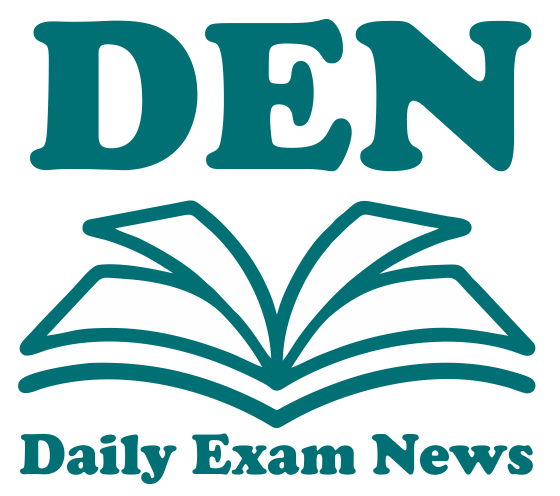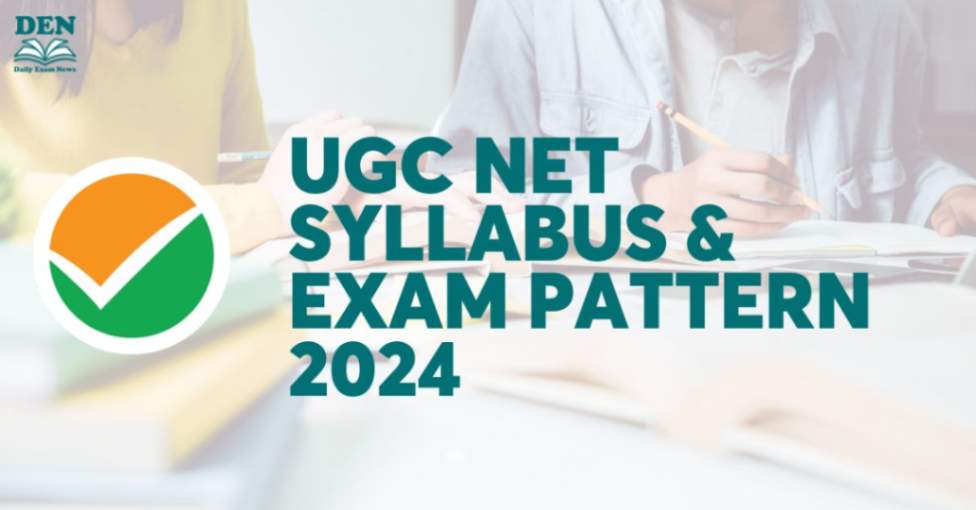The University Grants Commission NET exam for the June Session 2024 will conducted in CBT mode. The UGC NET June Exam 2024 will be held between 21 August and 04 September, 2024. The UGC NET Syllabus is strategically designed to assess the candidate’s proficiency in various subjects for eligibility to teach at the university level and for research fellowships. It covers a wide array of disciplines, such as teaching aptitude, communication skills, environment, education, data interpretation, etc., in Paper I to specific subjects related to the candidate’s post graduation degree in Paper II. Thus, candidates preparing for this examination must be well-versed with the detailed, subject-wise UGC NET Syllabus to plan their preparation effectively. Read on, for details.
UGC NET Exam Pattern 2024
Before we delve into the detailed UGC NET Syllabus for the June 2024 cycle, here is a brief overview of the UGC NET Exam Pattern. This will help you get an idea of the marking scheme, sectional weightage and type of questions asked in the exam. For this session, the exam will be conducted in online CBT mode.
| UGC NET Exam Pattern; Overview | ||
| Component | Paper I | Paper II |
| Subject | Teaching & Research Aptitude | Concerned Subject (as opted) |
| No. of Questions | 50 | 100 |
| Marks Per Question | 2 | 2 |
| Total Marks | 100 | 200 |
| Type of Questions | MCQs | MCQs |
| Duration | 3 hours | |
| Negative Marking | No | |
UGC NET Syllabus 2024
The UGC NET Syllabus for Paper 1 has topics related to Teaching and Research Aptitude. This is common for all candidates. The UGC NET Syllabus for Paper 2 comprises topics from the subject opted by the candidate, based on the subject of their post graduation. In the following sections we have discussed the detailed UGC NET Syllabus for Paper 1 and Paper 2.
UGC NET Syllabus for Paper 1
The UGC NET Paper 1 Syllabus comprises 10 units covering various aspects of Teaching & Research Aptitude such as ICT, Communication, Reasoning, etc. Five questions of 2 marks each will be asked from each of these ten units. The detailed syllabus is presented below.\
UGC NET Syllabus for Teaching Aptitude
- Teaching: Concept, Objectives, Levels of teaching (Memory, Understanding and Reflective), Characteristics and basic requirements.
- Learner’s characteristics: Characteristics of adolescent and adult learners (Academic, Social, Emotional and Cognitive), Individual differences.
- Factors affecting teaching related to: Teacher, Learner, Support material, Instructional facilities, Learning environment and Institution.
- Methods of teaching in Institutions of higher learning: Teacher centred vs. Learner centred methods; Off-line vs. On-line methods (Swayam, Swayamprabha, MOOCs etc.).
- Teaching Support System: Traditional, Modern and ICT based.
- Evaluation Systems: Elements and Types of evaluation, Evaluation in
- Choice Based Credit System in Higher education, Computer based
- testing, Innovations in evaluation systems.
UGC NET Syllabus for Research Aptitude
- Research: Meaning, Types, and Characteristics, Positivism and Postpositivistic approach to research.
- Methods of Research: Experimental, Descriptive, Historical, Qualitative
- and Quantitative methods.
- Steps of Research.
- Thesis and Article writing: Format and styles of referencing.
- Application of ICT in research.
- Research ethics.
UGC NET Syllabus for Comprehension
- Questions will be asked based on a given passage to assess the candidate’s reading and comprehension skills.
UGC NET Syllabus for Communication
- Communication: Meaning, types and characteristics of communication.
- Effective communication: Verbal and Non-verbal, Inter-Cultural and group communications, Classroom communication.
- Barriers to effective communication.
- Mass-Media and Society.
UGC NET Syllabus for Mathematical Reasoning and Aptitude
- Types of reasoning
- Number series
- Letter series
- Codes and Relationships
- Mathematical Aptitude (Fraction, Time & Distance, Ratio, Proportion and Percentage, Profit and Loss, Interest and Discounting, Averages etc.).
UGC NET Syllabus for Logical Reasoning
- Understanding the structure of arguments: argument forms, structure of
- categorical propositions, Mood and Figure, Formal and Informal fallacies,
- Uses of language, Connotations and denotations of terms, Classical
- square of opposition.
- Evaluating and distinguishing deductive and inductive reasoning.
- Analogies.
- Venn diagram: Simple and multiple use for establishing validity of
- arguments.
- Indian Logic: Means of knowledge.
- Pramanas: Pratyaksha (Perception), Anumana (Inference), Upamana
- (Comparison), Shabda (Verbal testimony), Arthapatti (Implication) and
- Anupalabddhi (Non-apprehension).
- Structure and kinds of Anumana (inference), Vyapti (invariable relation),
- Hetvabhasas (fallacies of inference).
UGC NET Syllabus for Data Interpretation
- Sources, acquisition and classification of Data
- Quantitative and Qualitative Data
- Graphical representation (Bar-chart, Histograms, Pie-chart, Table-chart and Line-chart) and mapping of Data
- Data Interpretation
- Data and Governance.
UGC NET Syllabus for Information and Communication Technology (ICT)
- ICT: General abbreviations and terminology.
- Basics of Internet, Intranet, E-mail, Audio and Video-conferencing.
- Digital initiatives in higher education.
- ICT and Governance.
UGC NET Syllabus for People, Development and Environment
- Development and environment: Millennium development and Sustainable
- development goals.
- Human and environment interaction: Anthropogenic activities and their
- impacts on the environment.
- Environmental issues: Local, Regional and Global; Air pollution, Water
- pollution, Soil pollution, Noise pollution, Waste (solid, liquid, biomedical,
- hazardous, electronic), Climate change and its Socio-Economic and
- Political dimensions.
- Impacts of pollutants on human health.
- Natural and energy resources: Solar, Wind, Soil, Hydro, Geothermal,
- Biomass, Nuclear and Forests.
- Natural hazards and disasters: Mitigation strategies.
- Environmental Protection Act (1986), National Action Plan on Climate
- Change, International agreements/efforts -Montreal Protocol, Rio Summit,
- Convention on Biodiversity, Kyoto Protocol, Paris Agreement, International
- Solar Alliance.
UGC NET Syllabus for Higher Education System
- Institutions of higher learning and education in ancient India
- Evolution of higher learning and research in Post Independence India
- Oriental, Conventional and Non-conventional learning programes in India
- Professional, Technical and Skill Based education
- Value education and environmental education
- Policies, Governance, and Administration.
UGC NET Syllabus for Paper 2
The UGC NET Paper 2 Syllabus is different for each subject. Candidates can download the subject-wise syllabus for Paper 2 from the table given below.
| Subject Code | Subject | UGC NET Syllabus in English | UGC NET Syllabus in Hindi |
| 01 | Economics / Rural Economics /Cooperation / Demography / Development Planning/ Development Studies / Econometrics/ Applied Economics/Development Eco./Business Economics | Download | Download |
| 02 | Political Science | Download | Download |
| 03 | Philosophy | Download | Download |
| 04 | Psychology | Download | Download |
| 05 | Sociology | Download | Download |
| 06 | History | Download | Download |
| 07 | Anthropology | Download | Download |
| 08 | Commerce | Download | Download |
| 09 | Education | Download | Download |
| 10 | Social Work | Download | Download |
| 11 | Defence and Strategic Studies | Download | Download |
| 12 | Home Science | Download | Download |
| 14 | Public Administration | Download | Download |
| 15 | Population Studies | Download | Download |
| 16 | Music | Download | Download |
| 17 | Management (including Business Admn. Mgt./Marketing/ Marketing Mgt./Industrial Relations and Personnel Mgt./ Personnel Mgt./Financial Mgt./Co-operative Management) | Download | Download |
| 18 | Maithili | Download | Download |
| 19 | Bengali | Download | Download |
| 20 | Hindi | Download | |
| 21 | Kannada | Download | Download |
| 22 | Malayalam | Download | Download |
| 23 | Oriya | Download | Download |
| 24 | Punjabi | Download | Download |
| 25 | Sanskrit | Download | Download |
| 26 | Tamil | Download | Download |
| 27 | Telugu | Download | Download |
| 28 | Urdu | Download | Download |
| 29 | Arabic | Download | Download |
| 30 | English | Download | Download |
| 31 | Linguistics | Download | Download |
| 32 | Chinese | Download | Download |
| 33 | Dogri | Download | Download |
| 34 | Nepali | Download | Download |
| 35 | Manipuri | Download | Download |
| 36 | Assamese | Download | Download |
| 37 | Gujarati | Download | Download |
| 38 | Marathi | Download | Download |
| 39 | French (French Version) | Download | Download |
| 40 | Spanish | Download | Download |
| 41 | Russian | Download | Download |
| 42 | Persian | Download | Download |
| 43 | Rajasthani | Download | Download |
| 44 | German | Download | Download |
| 45 | Japanese | Download | Download |
| 46 | Adult Education/ Continuing Education/ Andragogy/ Non Formal Education. | Download | Download |
| 47 | Physical Education | Download | Download |
| 49 | Arab Culture and Islamic Studies | Download | Download |
| 50 | Indian Culture | Download | Download |
| 55 | Labour Welfare/Personnel Management/Industrial Relations/ Labour and Social Welfare/Human Resource Management | Download | Download |
| 58 | Law | Download | Download |
| 59 | Library and Information Science | Download | Download |
| 60 | Buddhist, Jaina, Gandhian and Peace Studies | Download | Download |
| 62 | Comparative Study of Religions | Download | Download |
| 63 | Mass Communication and Journalism | Download | Download |
| 65 | Performing Art – Dance/Drama/Theatre | Download | Download |
| 66 | Museology & Conservation | Download | Download |
| 67 | Archaeology | Download | Download |
| 68 | Criminology | Download | Download |
| 70 | Tribal and Regional Language/Literature | Download | Download |
| 71 | Folk Literature | Download | Download |
| 72 | Comparative Literature | Download | Download |
| 73 | Sanskrit traditional subjects (including) Jyotisha/Siddhanta Jyotish/ Navya Vyakarna/ Vyakarna/ Mimansa/ Navya Nyaya/ Sankhya Yoga/ Tulanatmaka Darshan/ Shukla Yajurveda/ Madhav Vedant/ Dharmasastha/ Sahitya/ Puranotihasa /Agama). | Download | |
| 74 | Women Studies | Download | Download |
| 79 | Visual Art (including Drawing & Painting/Sculpture Graphics/Applied Art/History of Art) | Download | Download |
| 80 | Geography | Download | Download |
| 81 | Social Medicine & Community Health | Download | Download |
| 82 | Forensic Science | Download | Download |
| 83 | Pali | Download | Download |
| 84 | Kashmiri | Download | Download |
| 85 | Konkani | Download | Download |
| 87 | Computer Science and Applications | Download | Download |
| 88 | Electronic Science | Download | |
| 89 | Environmental Sciences | Download | |
| 90 | Politics including International Relations/International Studies including Defence/Strategic Studies, West Asian Studies, South East Asian Studies, African Studies, South Asian Studies, Soviet Studies, American Studies. | Download | Download |
| 91 | Prakrit | Download | Download |
| 92 | Human Rights and Duties | Download | Download |
| 93 | Tourism Administration and Management. | Download | Download |
| 94 | Bodo | Download | |
| 95 | Santali | Download | |
| 100 | Yoga | Download | Download |
| 101 | Sindhi | Download | Download |
| 102 | Hindu Studies | Download | Download |
| 103 | Indian Knowledge System | Download | Download |
Check here for more information-
Hopefully, this information was useful for all the aspiring candidates preparing for the government exams. Check DailyExamNews to stay informed about the latest recruitments, tests, vacancies, and developments regarding government exams.

